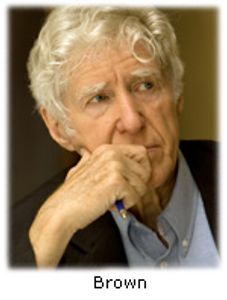
When Lester Brown spoke at Catawba College on Nov. 10, he did so with quiet urgency and some hope, warning his audience that unless civilization changes its ways, its end is truly near.
This environmental Paul Revere, the founder of Worldwatch Institute and current founder and president of Earth Policy Institute, says "we're in a race between natural tipping points and political tipping points," and that what we need most of all is for "the market to tell the environmental truth."
Sharing some of the points he makes in his most recent book, "Plan B 3.0 Mobilizing to Save Civilization," he paints a grim picture of civilization's current reality. He spoke of unprecedented ice melts occurring in some parts of the world including Greenland, the Tibetan Plateau and in the Himalayas, and the recent shocking rate of glacial flood caused by these melts.
Ice melts from the glaciers in both China and India typically sustain river flow during the dry season, he explains, allowing for crops such as wheat to grow and thrive. But melting at their current alarming rates may cause these glaciers to disappear and then, he prophesizes, "what happens to these glaciers will affect food prices everywhere."
Noting that China is the number one wheat producer in the world, India the second, and the United States the third, Brown explains "We are facing the threat that 1.3 billion Chinese may be competing for us for our grain supplies, driving up our food prices." He notes that the United States will not have the luxury of limiting sales to China because that country is also "our banker." Brown says he realizes that "even our (American) Christmases are made in China."
"We don't need to go beyond our ice melts to know that we're in trouble. How much are willing to spend to avoid a 23 foot rise in sea level?" he queries. "Indirect costs are shaping our future," he continues, and by ignoring these, "we're doing exactly the same thing as Enron, leaving costs off the books. Consuming today with no concern for tomorrow is not a winning philosophy."
He spoke of the rapid population growth and deforestation and "two new stresses – rising food and oil prices." "As oil prices go up, grain prices will follow," he quips. "The U.S. in an effort to reduce its fuel insecurity has created the world's food insecurity."
Brown says the Plan B program he advocates has three components which must be executed to stop civilization's demise: 1) raise energy efficiency; 2) development of renewable energy sources; 3) a ban on deforestation and the planting of trees in order to sequester carbon.
Hope comes into play, he explains, because "we're suddenly seeing this breakout thinking on a scale that did not seem possible a few years ago."
"We're beginning to see a seismic shift in the field of renewables," he says. "We're in the early stages of an economy switching from oil and coal to wind, solar and geothermal." In Texas, Brown notes, there is a new business of wind-generated power; the Scots have made an investment to create a wind generation farm in the North Sea; in Algeria, plans are being made to produce solar-thermal power plants which can export energy to Europe by undersea cable; and in Indonesia, the land of many volcanoes, geothermal resources are being harnessed from these volcanoes.
In the past, although there was an abundance of renewable energy available, the challenge was "how to harness it efficiently," he explains. Today, thanks to advancements in wind-generated power technology, "we're investing in an energy system that can last as long as the earth itself. For the first time since the industrial revolution began, we have the opportunity to build an energy system that will last forever to leave for the next generation."
Brown spoke of the present as "an exciting time with all sorts of possibilities," because "we have the potential to build an entirely new fuel economy." But, he concludes "the question becomes how do we get from here to there."
He reiterates: "We need to get the market to tell the environmental truth," because currently the market does not include the cost of climate change which is caused by burning fossil fuels. "Another way to get there is the cap and trade system," he notes, wherein carbon emissions are restricted and rights are sold to produce these. Companies which produce these emissions buy carbon permits which are tradable.
"If we don't act quickly and decisively, we may have to answer questions we don't want to answer," he says. "We are looking at a rise in sea level and we are primarily responsible."
If we do not act, he asks, "How will this affect our sense of self?
"We need to get involved – politically involved," Brown says, noting that there is more cause for hope with the recent presidential election of Barack Obama.
Brown's lecture at Catawba College was sponsored and organized by the College's Center for the Environment which is under the direction of Dr. John Wear.
RELATED CONTENT:
-
;
- About Lester Brown ;
- Center for the Environment ;
- Environmental Science & Studies ;
- Presidents Climate Committment
